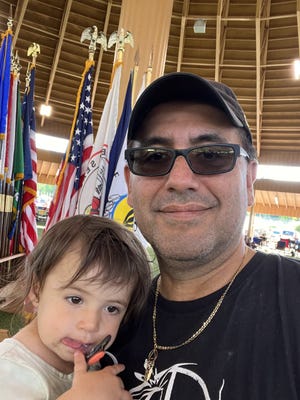‘It’s great to embrace who I am.’ Rob Michno, 50, is only now discovering his Native American roots after being adopted and raised by a family of German and Polish descent.

OSHKOSH - Throughout much his life, Rob Michno went along with whatever people assumed he was, whether that was Mexican, Italian or Jewish.
“I went out of my way to deny I was Native American,” he said.
It wasn’t until a few years ago that Michno, 50, of Oshkosh, really started delving into his heritage and found it has been an enlightening, life-changing experience.
“It’s been so empowering,” he said. “The puzzle pieces are coming together. … Now, it’s great to embrace who I am.”
Michno was adopted by a family of German and Polish descent from Merrill in 1973.
“Somehow, I knew I was Native American, but it was not discussed when I was growing up,” he said.
Michno’s adopted parents wanted to appear they were a biological family.
“My mom dyed her hair black and would tan to try to look like me,” he said. “According to who I call my brother, he said our parents had about seven miscarriages, so protecting our family of four seemed to be of utmost importance. I understand that … and they did the best they could, so there’s no negativity.”
Michno still had emotional issues from not knowing his heritage and felt a degree of being different, abandoned and rejected while growing up.
“Growing up in a very German-rooted town, I felt so different and was afraid to explore myself, of course, my coping mechanism of avoidance was my best tool I could counter some of those taunts on the playgrounds,” he said.
Those feelings helped fuel his alcoholism for 22 years, Michno said, until he sought help.
Michno is now 10 years sober, and after remarrying in 2017, he found an interest in discovering his heritage, especially so his 3-year-old daughter, Audrey, can know more about where her people came from.
After becoming sober, he accepted he is Native American, but hadn’t known to which tribe he belonged.
During a fellowship sobriety meeting, Michno was asked which tribe he was from and struggled with an answer.
“I answered because I was born in Rhinelander and that Rhinelander is in Oneida County, I think I’m Oneida,” he said. “That’s how oblivious I was.”
Michno eventually reached out to the Wisconsin Department of Children and Families and connected with an adoption coordinator in Madison who told him his birth mother was half Ho-Chunk and half Forest County Potawatomi.
He later learned he had been enrolled in the Forest County Potawatomi Tribe in 1978 by another biological family member under his birth name of Mark Edward Johnson.
“What was odd with that first reading of the adoption paperwork is that I could read a few pages at a time and had to process this all,” Michno said. “It was the story of Mark Edward Johnson and it was odd reading Mark’s story and having it sink in that Mark was me.”
He also later learned his birth mother, Pauline Johnson, died in 1989 and is still uncertain who his birth father is.
Michno has been meeting his birth cousins from the Johnson family for the first time in the past few years, mostly virtually during the pandemic, and is eager to start meeting more family members in person.
He’s been attending pow-wows and other community events with his family, trying to learn more about his heritage.
“I’m a cultural infant,” Michno said.
One of his cousins is Manny Johnson, who serves as the tribal treasurer for the Forest County Potawatomi.
“Growing up, I knew my aunt had a child, but we didn’t know if it was male or female,” Johnson said. “It was a closed adoption. We didn’t talk about it back then.”
He said his father had tried to find his biological nephew, Mark Johnson, not knowing his adopted name was Rob Michno, in the hopes of connecting as a family. But he was unsuccessful.
“I’m saddened we missed a lot of years together,” Johnson said of Michno. “We couldn’t believe we found each other. It was almost something out of a movie.”
He said he speaks with Michno on a monthly basis, but still has yet to have a proper long meeting going through photo albums, because of the ongoing pandemic.
“He has some of the same mannerisms as his mom, such as in the way he laughs,” Johnson said of Michno.
Michno was adopted before the passage of the Indian Child Welfare Act of 1978, which gives preference to tribal families in adopting Native children.
Johnson wonders how Michno’s life would have been different had he been adopted by another Potawatomi family, or even his own family.
For his part, Michno said his adopted parents loved him as best they could and hasn’t formed an opinion on a new U.S. Supreme Court case that challenges the validity of the Indian Child Welfare Act.
A white couple from Texas is challenging the act after it nearly thwarted their adoption of a Navajo child, claiming the act is discriminatory based on race.
Tribal attorneys, including those representing the Oneida Nation of Wisconsin, said the law is not based on race, but on tribal sovereignty, and that tribes are sovereign nations that should look after their own citizens.
A decision on the case is not expected until early to mid 2023.























No comments:
Post a Comment
Please: Share your reaction, your thoughts, and your opinions. Be passionate, be unapologetic. Offensive remarks will not be published. We are getting more and more spam. Comments will be monitored.
Use the comment form at the bottom of this website which is private and sent direct to Trace.